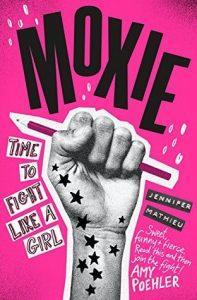“My English teacher Mr Davies rubs a hand over his military buzz cut. There’s sweat beading at his hairline, and he puffs out his ruddy cheeks. He looks like a drunk porcupine. The drunk part may be true. Even if it is before lunch on a Tuesday.”
It’s time to fight like a girl!
Moxie is Jennifer Mathieu’s fifth novel. Published in 2017, it has since been turned into a popular Netflix movie. Both the book and the film are increasingly becoming more popular in wake of the #metoo and #imwithher movements.
It’s a feminist revolution that everyone needs to read. It’s inspiring and dramatic and acts as both a story and an instruction manual for all the women out there who have ever been a victim of misogyism.
Summary
The story follows Vivian Carter, an average 16-year-old girl trying to navigate high school, new friends, and her first boyfriend. As well as that, she has to deal with #everydaysexism. The football team can do whatever they want. Teachers call the girls out constantly for tiny dress code violations. And harassment in the school hallways raises to a dangerous level. It isn’t long before she decides to fight back. Taking inspiration from her mother, who used to be a punk rock Riot Grrrl, Viv creates Moxie, a feminist zine for all the girls in her school. But between sexist teachers, a dismissive principle, and uncaring students, will Moxie fail before it even gets the chance to make a difference?
Commentary
Moxie is without a doubt one of the best books that I have ever read.
Praise
- It is the ultimate role model book for every young girl in the world. It sends a message; no matter who you are, no matter how small you feel, no matter what others say against you, your voice is important. This is an incredible example of feminist literature and will without a doubt be added to school and university courses in the future.
- Vivian is one of the most relatable characters I’ve ever read. She’s an ordinary girl who desperately wants to change how women are treated in her school, but she’s too nervous to speak up. She argues with her boyfriend, struggles to balance old and new friends, and has to deal with her mum’s new boyfriend. As a result, she’s an everyday girl-next-door that nearly everyone can relate to.
- Seth is the perfect example of the difference between a bad boy and a bad guy. It’s a thin line that most authors trip over, but Mathieu does not disappoint. Seth is genuinely interested in feminist movements and even supports the girls at school. He’s uncaring of what the other boys think of him for following Moxie and actually listens when Viv tries to explain what being a girl is like. He is one of the best male characters that has ever been written.
Critique
- First of all, it was near impossible for me to find criticisms since this is a fantastic novel. The main disclaimer I should mention is the reference to sexual assault. Nothing graphic is ever shown, but if the discussion of assault triggers you then be careful when reading.
- Some characters are stereotypical. All the footballers are meat-head-jock-bros with no regard whatsoever for women. While unfortunately this cliché is based on some semblance of truth, the chances of every single football player being a brainless brawn is unlikely. Likewise, there’s the balding-sexist-male-principal, the bad-boy-with-a-heart-of-gold, and the high-school-cliques-that-never-mix.
- As incredible as Seth is, however, his character is over-glorified a lot. We’ve all heard the argument “not all men”. Even though this book accurately addresses it… it then kind of ruins the whole debate by introducing this perfect-brilliant-feminist-bad-boy. While yes, I am incredibly grateful to have an openly feminist male character, it feels like Seth’s only role in the novel is as a placeholder for “not all men”. We don’t see why he thinks like this or what his motivations or goals are, he simply exists to fill in that blank.
Recommendations
Overall, I’d give Jennifer Mathieu’s Moxie a five out of five. It’s an incredible and realistic novel that showcases the #everydaysexism the majority of women suffer through. Simultaneously, it shows the difference that everyday people can make to put an end to misogynism.
I’d recommend this novel to absolutely every single person on this planet. For the girls, it’s proof that even though it doesn’t feel like it, you’re not alone and your voice matters. For the boys, it might just teach some of you a thing or two.

Want to read it for yourself?
Prefer to listen instead?
